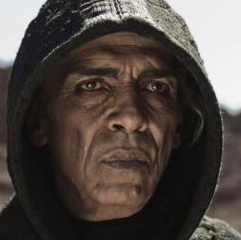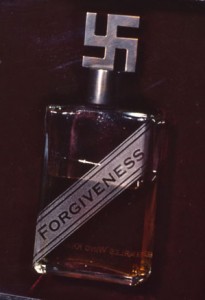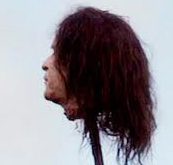Can Americans handle conservative (and even ultra conservative) art?

The History Channel says there was no intention of connecting “Satan” to President Barack Obama, calling the idea “utterly ridiculous.” (Photo: History Channel)
So let me say right at the start that this isn’t a “trend” story. There is no evidence that “the arts” are producing more conservatives, or more ultra-conservatives.
But with the proliferation of right-of-center media outlets and the viral nature of the internet, we have interesting new windows into the world of ring-wing art and artists that might have flown under the radar in earlier generations.
Right now “The Bible” on the History Channel is drawing attention for its glowing and sometimes racy re-interpretation of, well, the Holy Book.
It’s a spin on Scripture that includes a Barack Obama look-alike in the role of — wait for it — Satan. The series has been a hit.
Meanwhile, there’s a fascinating dust-up in the Pacific Northwest, where sculptor Charles Krafft was “outed” recently by a local weekly newspaper for embracing white nationalism and Holocaust deniers.
“I think he’s been demonized excessively,” Krafft said, referring to Adolph Hitler in an interview with public radio’s Studio 360.
“I’m not trying to resurrect National Socialism or Hitlerism, but my opinion of the man has changed considerably since I began my revisionist investigations.”
Krafft is a hugely respected artist, clearly a bright, thoughtful guy and a mainstay of the arts community in his region, whose work — including a Hitler-themed tea pot — has been collected by museums nationwide.
In the past, his fascinating explorations of Swastikas and other National Socialist symbolswere viewed as irony or transgression.

A work by Charles Krafft. Irony? Or some other form of political expression. (Photo: CharlesKrafft.com)
Now? Not so much.
But his fringe-conservative views have sparked consternation and hand-wringing and Krafft’s entanglement isn’t unique.
Long-time “alt-folk” musician Michelle Shocked has drawn heavy fire recently after emerging as a vocal born again Christian and reportedly telling her audience that God “hates fags.”
“I live in fear,” Shocked said, “that the world will be destroyed if gays are allowed to marry.”
A similar controversy has long embroiled one of the country’s most respected and beloved writers.
Orson Scott Card, whose “Ender” series is a mainstay for young readers and sci-fi fans, has been vocal for years with his aggressively anti-homosexual views.
Card has written at length about the idea of an actual war embroiling the United States, pitting conservatives against liberals.

Orson Scott Card’s novel about an armed war between liberals and conservatives is described as a “disturbing look at a possible future” for America.
In a commentary written for the Mormon Times, Card seemed to embrace the idea of armed resistance if same-sex marriage is legalized.
“Marriage has only one definition, and any government that attempts to change it is my mortal enemy,” Card wrote. “I will act to destroy that government and bring it down.”
Those views forced DC comics to shelve plans to have Card pen a story for their Superman line of comics, and have also complicated plans for a Hollywood movie based on “Ender’s Game.”
As a side wrinkle, there is also a fascinating urban myth-style screed circulating that purports to share the anti-big-government views of Bill Cosby.
“I’m tired of being told that I have to “spread the wealth” to people who don’t have my work ethic. I’m tired of being told the government will take the money I earned, by force if necessary, and give it to people too lazy to earn it.”
Turns out the conservative tirade — which also targets Muslims and climate change activists — is a hoax, that lives virally via email and Facebook.
I think it’s fair to say that these kind of right-wing views are more shocking in the art and media world than comparable views on the left.

HBO acknowledged that the head on a pike in “Game of Thrones” looked uncomfortably like former President George W. Bush (Image: HBO)
(HBO did get in a spot of trouble when their “Game of Thrones” series included an image of George W. Bush’s severed head.)
But artists across the political spectrum have long been eccentric contrarians, embracing behavior and lifestyles that jar convention.
And I think it’s also probable that a lot of artists with right-leaning views keep them under tight wraps, for fear of facing the kind of backlash that has embroiled Krafft, Card and Shocked.
So what do you think? When an artist you like stakes out a political position you disagree with — perhaps even a political position you find morally indefensible — do you stop reading his books or seeing her movies or buying his sculpture?








It’s very different. Many socialists and communists are decent, well intentioned people. They are not Stalinists and probably resent that association. There are no good Nazis that I’m aware of.
Will, don’t get me started on Genghis Khan who – when judged fairly – was probably the greatest and most influential man who ever lived aside from religious figures. But, of course, he wasn’t an artist. Except that he brought diplomacy and conquest to a level of art.
He was a great conqueror, but what did he leave behind? What parts of Law, Literature, Politics, Art, did he impact or influence? Really he had no lasting impact at all but was basically a very successful parasite but really a dead end on most things as far as any sort of lasting impact. They built no roads, built no lasting art, they established no new forms of government, discovered nothing scientifically, the Romans and ancient Egypt have it all over that guy. I think certainly he impacted military strategy, but beyond that I don’t see him as influential.
According to Wikipedia, Kahn did have one quality not seen in many leaders of today, even many leaders in the US Senate and Congress. He was religiously tolerant and interested in learning philosophical and moral lessons from other religions. To do so, he consulted Buddhist monks, Muslims, Christian missionaries, and the Taoist monk Qiu Chuji.
Mervel, you should read “Genghis Khan and the Making of the Modern World” by Jack Weatherford.
Genghis Khan remade the history of the world. The Mongols created a safe empire that spanned from eastern Europe to the Pacific which allowed the fabled Silk Road to flourish, and much of that empire was formed in just the last 30 years of G K’s life. A bigger Empire than the Romans or Alexander, and GK was born a poor child in a tent on the steppe. No education, no military training, he was the world’s greatest self-made man. The Silk Road, which was a network of trade routes with caravan serais ( basically, walled hotels) a days journey apart, brought not just trade goods but moved ideas and science across the corners of the earth which was a great benefit to Europe at the time since they were in the Dark Ages while in Bagdad and Persia and China scientists were developing higher mathematics and astronomy. The Mongols created paper money, the pony express about 600 years before the Pony Express, invented the concept of diplomatic immunity and many other things.
Because their Empire was so large the Mongols became very good at systems of management and were, as Pete points out very tolerant of other people, ideas and religion. They didn’t have much use for hereditary rule though and when they conquered a place they generally slaughtered the royal classes since they didn’t seem to offer much to society in general. And it should be noted that the Mongols never fought without first giving their opponent an opportunity to become a part of the empire.
Without the Mongols Europe wouldn’t have had the Renaissance in the same way. Why did Columbus sail west? Because he wanted to open a sea trade route to China after the Ottoman Empire blocked trade to the East. How did anyone in Europe know about China? Because of the Silk Road trade and all of the good stuff available in the East but not in Europe. And also because of the mathematics and astronomy brought to Europe that allowed advances in map making and navigation. Let’s not forget the gunpowder and muskets that Europeans used to subjugate the people of the New World. Invented in China. Paper, China. Pasta, China. Silk, China.
Genghis Khan was ruthless, true. It has been speculated that he intentionally spread stories about how vicious he was as propaganda to strike fear in the hearts of enemies – kind of like Shock and Awe. People have added up the numbers on people the Mongols supposedly killed and it turns out to be more people than were alive on the planet at the time, including in the Western Hemisphere.
In size I totally agree, they were and really are the biggest empire, which done on horse back is really amazing.